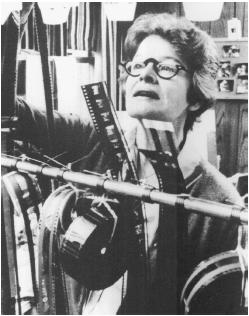 Otišao je još jedan moj idol. Otišla je doktorka za montažu. Hvala ti Dede što si pokazala kako se prave filmovi.
Otišao je još jedan moj idol. Otišla je doktorka za montažu. Hvala ti Dede što si pokazala kako se prave filmovi.
Odabrana filmografija.
- The Hustler (1961 - Rossen)
- America, America (1963 - Kazan)
- Bonnie & Clyde (1967 - Penn)
- Rachel, Rachel (1968 - Newman)
- Alice's Restaurant (1969 - Penn)
- Little Big Man (1970 - Penn)
- Serpico (1973 - Lumet)
- Dog Day Afternoon (1975 - Lumet)
- Night Moves (1975 - Penn)
- The Missouri Breaks (1976 - Penn)
- Reds (1981 - Beatty)
- The Breakfast Club (1985 - Hughes)
- Henry & June (1990 - Kaufman)
- The Addams Family (1991 - Sonnenfeld)
- Wonder Boys (2000 - Hanson)
- Have Dreams, Will Travel (2007 - Isaacs)
Nominacije za Oskara
- 1976 – Dog Day Afternoon (nomiinacija) Academy Award Najbolja montaža
- 1982 – Reds (nominacija) (nomiinacija) Academy Award Najbolja montaža
- 2001 – Wonder Boys (nomiinacija) Academy Award Najbolja montaža
Ostale nagrade i nominacije
- 1962 – The Hustler (nomiinacija) American Cinema Editors (ACE) Eddie Best Edited Feature Film
- 1968 – Bonnie and Clyde (nomiinacija) American Cinema Editors (ACE) Eddie Best Edited Feature Film
- 1975 – Dog Day Afternoon BAFTA Film Award - Best Editing
- 1982 – Reds (nomiinacija)American Cinema Editors (ACE) Eddie Best Edited Feature Film (w/ co-editor Craig McKay)
- 1982 – Women in Film Crystal Award[6]
- 1994 – American Cinema Editors (ACE) Career Achievement Award
- 1999 – Hollywood Film Festival Outstanding Achievement in Music Editing
- 2000 – Las Vegas Film Critics Association Awards Career Achievement Award
Blogovi autora
- O ulozi predsednika države u procesu pomirenja... (0)
- Neka čudna zemlja (5)
- Odlazak Kraljice disko muzike (22)
- Umro je Drug Tito! (321)
- Θεόδωρος Αγγελόπουλο (27. April 1935 – 24. Januar 2012.) (12)
- Nominacije za Oskara (56)
- Tako je govorio Ron (54)
- Imamo problem (110)
- Miomir Miki Stamenković (1927-2011) (3)
- Ken Russell (3. jul 1927 – 27. novembar 2011) (27)
- Freddie Mercury (94)
- Roboti su ponovo u modi (repriza) (64)
- korisnicki@mts.telekom.rs (63)
- Նռան գույնը, (24)
- Je l' za ovo(g) dajemo pare? (86)
- Summertime repriza (43)
- Ду ју спик инглиш, министарко? (210)
- Leksikon (80)
- Sveti Opel (302)
- Dame Elizabeth Rosemond Taylor (1932 – 2011) (40)
Najnovije VIP blogeri
- Javna rasprava o Beogradskom sajmu i Generalštabu
Đorđe Bobić - Gde je krenuo Saban
natasa_tasic_10 - Davimo Beograd iliti DB
Ivan Blagojevic - Oda Drustvenim Naukama
Spiridon - OTVORENO PISMO MINISTARSTVU ZDRAVLJA
razmisljam - Dovidjenja, gospodine Bobicu!
angie01 - Klasicna tema- Beograd, popodne i gitare
jednarecfonmoi - Fragmenti stvarnosti u opštem prividu
Hansel - Horizontala, koja ne da vertikali da se vidi
angie01 - СРБИЈА ‒ ЗАЈЕДНИЧКА ДОБРОБИТ И КАЗНА
Predrag Brajovic
Najnovije blogeri
- DUB PUB: Stepping Out From The System
docsumann - Majstor za ljuljaške, klackalice, tobogane i ... II DEO
Filip Mladenović - ŽUTA OSA (8/24)
horheakimov - DUB PUB: Milion kvadrata
docsumann - Dokon um đavolje igralište
zilikaka - НАЦРТ РЕЗОЛУЦИЈЕ О ГЕНОЦИДУ У СРЕБРЕНИЦИ
Filip Mladenović - DUB PUB: A Bright New Day Is Coming
docsumann - Srbija u EU i NATO do 2030...
Filip Mladenović - DUB PUB: Woman, Hey
docsumann - DUB PUB: No Love, No Home
docsumann
Arhiva
Kategorije aktivne u poslednjih 7 dana
- Društvo (4)
- Život (4)
- In memoriam (2)
- Muzika (2)
- Zdravlje (2)
- Literatura (2)
- Eksperimenti u blogovanju (2)
- Gradjanske inicijative (2)
- Moj grad (2)
- Biz (1)

